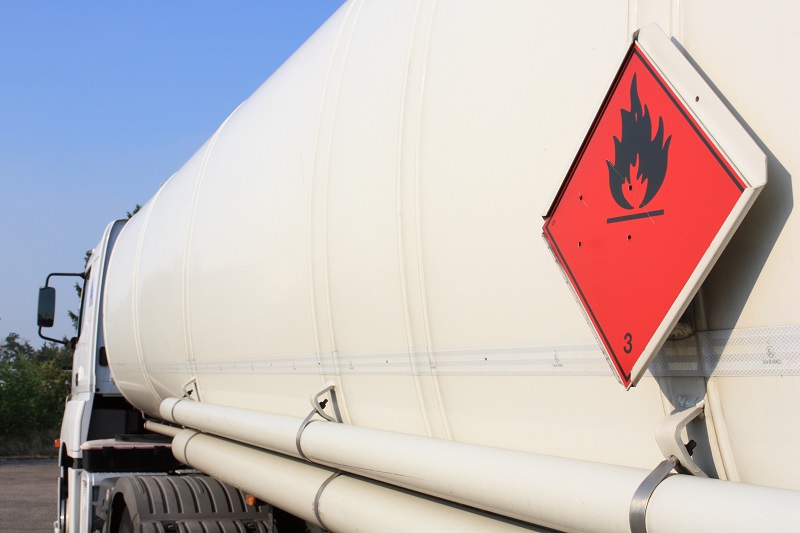It’s important for the owners and operators of big trucks — 18-wheeler, a tractor trailer, a semi-truck or tanker — to maintain their vehicles and obey the rules and regulations that the State of Florida and federal government have enacted to keep the roads safe. Accidents involving automobiles and big trucks are among the most devastating on the roads. With the vast difference in size and weight, a collision between a big truck and an automobile can result in property damage, severe injuries and even death.
Another big danger of a collision between an automobile and a big truck is that the truck may lose its cargo during the accident. We’ve all heard humorous news stories about trucks losing cargos of donuts, ice cream, shoes, beer and even livestock. Not all loads are so harmless. Many trucks on the road carry cargos of hazardous materials, or HAZMATs, that can be dangerous and even deadly if released into the environment.

HAZMATs in Florida
The Florida CDL Handbook describes hazardous materials as “products that pose a risk to health, safety, and property during transportation.” The U.S. Department of Transportation divides hazardous materials into nine classes:
- Explosives (ammunition, dynamite)
- Compressed gas (propane, oxygen)
- Flammable liquid (gasoline, acetone)
- Flammable solids, (matches, fuses) spontaneously combustible materials (linseed oil, manure) or materials that are dangerous when wet (potassium, calcium carbide)
- Oxidizers or organic peroxides (ammonium nitrate)
- Toxic or infectious substances (pesticides, medical waste)
- Radioactive (uranium, plutonium)
- Corrosive (battery acid, hydrochloric acid)
- Miscellaneous (formaldehyde, asbestos)
Hazardous materials not only have the potential to cause serious injury and death for those involved in truck accidents, but they can also endanger the surrounding environment, prompting road closures and evacuations. Many hazardous products have the potential to injure or kill on contact. Innocent bystanders who had no involvement with the accident may become injured as a result of being exposed to a hazardous material that was released into the environment during and after a HAZMAT truck accident.
Rules and Regulations for Transporting HAZMATs in Florida
All Florida HAZMAT truck drivers must know and follow the rules and regulations about transporting hazardous materials. The state’s hazardous waste regulations for transporters and transfer facilities are more comprehensive than the federal regulations. They are designed to protect drivers and others from being exposed to hazardous materials, by establishing protocols for safely containing the products during their packaging, loading, transporting and unloading; identifying the materials and communicating their risk; ensuring the driver has the proper training for transporting hazardous materials; and inspecting the vehicle to make sure it is in safe operating condition.
When big truck owners and operators fail to follow the rules and regulations pertaining to the transport of hazardous materials, terrible accidents may result. An accident victim could face serious injury or illness after being exposed to a hazardous material, even if they were not hurt in the impact.
Have You Been Injured in a Hazardous Material Truck Accident in Florida?
If you or a loved one has been hurt in an accident involving a big truck hauling hazardous materials, Florida law allows you to seek compensation for pain, suffering, medical bills and economic losses not only for the injuries caused by the accident, but also for any injuries or illnesses caused by exposure to a hazardous material.
Lutz truck accident attorney Tania Rivas and the Rivas Law Group have helped many Florida residents recover the compensation they deserve for injuries caused by the negligent acts of a truck driver and their employers. Investigating a truck accident is always a challenging task; establishing fault in a HAZMAT truck accident is much more difficult and involves not only examining the cause of the accident, but also determining:
- Were the hazardous materials properly contained and secured?
- Was the truck displaying the required placards to identify the hazardous materials the truck was hauling?
- Was the driver carrying the required documentation for transporting the hazardous materials?
- Did the negligence of a third party (for instance, the manufacturer of the hazardous material) play any part in the accident?
There are statutes of limitation laws in Florida that limit the amount of time you have to take action to protect your rights after a truck accident. Don’t delay — contact the Rivas Law Group today to schedule your free consultation to discuss your case.



